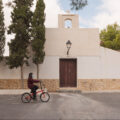Religions in Spain pursue collaboration rather than confrontation
Religions in Spain pursue collaboration rather than confrontation
As minority religions increase their numbers in Spain, interreligious dialogue and collaboration become more important than ever.
In the 15th century, the Spanish Inquisition meant Jews and Muslims were forced to leave the country.[1] Since then, religion in Spain has been greatly dominated by Catholicism. However, in recent decades, as well as the number of Catholics declining, there has been an increase in people belonging to other religions in Spain.
This greater degree of pluralism has led to new attempts to increase interreligious dialogue. As this article will show, whilst many of these initiatives are promising, there are also potential issues that they face and will have to overcome.
A pluralist Spain
In 1975, 87% of Spaniards said they were ‘practicing Catholics’.[2] By 2020, this number was estimated at just 20.4%.[3] Meanwhile, the number of Muslims passed 2 million for the first time in 2020, constituting over 4% of the total population.[4] Other religions such as Evangelism have also increased their number of followers, with 1.2 million Spaniards belonging to the faith.[5]
These changes have been recognised by the Spanish government. In June 2020, the vice-president Carmen Calvo announced her commitment to “the rights of religious minorities” in Spain.[6] Following this, she began a round of meetings with representatives of different faiths, to listen to their requests and needs.[7]
Shared interests and joint campaigns
With this religious pluralism of modern Spain becoming ever clearer, in recent years there have been clear attempts between religions to unite on the basis of shared interests. These initiatives demonstrate both potential successes as well as challenges.
In February 2023, representatives of various religions attended a meeting held at the headquarters of the Spanish Episcopal Conference. The attendees discussed a response to the Spanish government’s plans to widen access to abortion and to legalise euthanasia. Representatives of the Islamic, Evangelical, and various Orthodox churches joined with the Catholic Church in signing a letter expressing their concern about the policy.[8]
Whilst this may have shown signs of the potential interreligious dialogue, there was also evidence of problems. First of all, not all religions wished to support the statement. Whilst the statement spoke of the “common denominator between the signatories” as being the “children and descendants of Abraham,” the Federation of Jewish Communities of Spain rejected the chance to support the initiative.[9]
However, beyond failing to bring together all faiths, the statement also demonstrates another challenge, and perhaps motive, of interreligious dialogue. Whilst various faiths may oppose the practices of abortion and euthanasia, the Spanish population overall does not agree. A 2020 poll showed that 83% of Spaniards are in favour of the legalisation of abortion.[10] Meanwhile, a 2019 poll, taken before its legalisation in 2021, showed between 75% to 85% supported the decriminalisation of euthanasia.[11] Therefore, whilst interreligious dialogue may help bring understanding between different faiths, it may also serve to underline how religious groups in Spain are on the opposite side to the majority of Spaniards on a number of key issues.
The same rights for all
One area in which interreligious cooperation could be particularly positive is in ensuring that the same rights apply to all religious groups in Spain. Since 1979, Spaniards have been able to tick a box, known as ‘box X’, on their tax forms. Selecting this box means 0.7% of their income tax is given to the Catholic Church, a key source of income for the institution.[12] However, in recent years, minority faiths, such as Evangelical and Islamic groups, have criticised the fact that they do not have the same option for their faiths.[13]
In 2021, the Catholic bishop of Bilbao, Joseba Segura, expressed the view of the Spanish Episcopal Conference that it was a “fantastic” idea for faiths such as Islam, Evangelism, and Judaism to be granted “their right” to donate to their religions in this way.[14] Similarly, the Catholic Church has added its name to the campaign of the Islamic Commission of Spain to institute the teaching of Islam to Muslim students in the Spanish schooling system.[15]
In these two examples we can see an important feature of interreligious collaboration. This is the recognition of the fact that Spain is now a pluralist society and members of other faiths must have the same rights that Catholics do.
Calming tensions
Yet perhaps the most important thing that interreligious dialogue in Spain can offer is a way of calming tensions between religious communities in Spain.
On 25 January 2023, a Moroccan national, Yassine Kanjaa, entered a church in the Andalucian municipality of Algeciras wielding a knife. He attacked and killed a churchwarden, before continuing to a second church, injuring a further four people before being detained by police. Kanjaa allegedly shouted “Allah” as he attacked the churchwarden.[16]
Whilst the attack was immediately condemned by the Spanish Islamic Commission, this did not stop the far-right party Vox seeking to link it to the wider Muslim community.[17] Their spokesman held an event in Algeciras the following day stating that “Islamism is now in our land because some wish to open the doors … and the consequences are suffered by us, the Spaniards.”[18]
Yet, when it came to the Catholic Church, in whose sacred place the attack had taken place, the message was quite different. Bishop García Magán, the spokesperson of the Episcopal Conference, made a speech stating that “we must not fall victim to provocations,” and importantly adding that “whilst there has been a motivation of faith [behind the attack], we clearly cannot and must not demonise individual groups or collectives.”[19]
As well as these comments, a meeting of a platform named ‘the Pact of Coexistence’ was held in Madrid, with the aim of “demonstrating unity.” The platform was made by leading figures from Catholicism, Islam, and other minority faiths and civil society groups, and during the meeting they sought to “agree strategies that strengthen our response to extremism and discourses of hate.”[20]
Evidently, Spain is moving to a new pluralistic reality of multiple religions with followings in the nations. What is promising is that rather than deepen tensions, it seems these religions are trying to work together. However, they must also be careful that by focusing on what unites them, they fail to interact with the wider, non-religious or non-practicing majority of Spaniards.
Interested in similar topics? Go to our Dashboard to learn more.
Sources
[1] Spanish Inquisition | Definition, History, & Facts | Britannica
[3] El porcentaje de católicos españoles se sitúa, por primera vez, por debajo del 60 por ciento
[4] Los musulmanes en España superan por primera vez los 2 millones de personas
[5] Los evangélicos, cerca del 2% de la población en España – Protestante Digital
[6] Carmen Calvo se compromete con los derechos de las minorías religiosas y la “neutralidad de los poderes públicos” ~ Salam Plan
[7] Calvo concluye la ronda de reuniones con principales confesiones religiosas (lavanguardia.com)
[8] Los líderes de las principales religiones en España arremeten conjuntamente contra las leyes del aborto y de la eutanasia | Sociedad | EL PAÍS
[9] Los líderes de las principales religiones en España arremeten conjuntamente contra las leyes del aborto y de la eutanasia | Sociedad | EL PAÍS
[10] El 83% de los españoles está a favor de la legalización del aborto, 5 puntos menos que en 2014 | Ipsos.
[11] La despenalización de la eutanasia en España: 9 razones a favor y 9 respuestas – Bioetica en la Red
[12] Declaración de la Renta 2021 – 2022: ¿En qué consisten las casillas de la Iglesia y la de fines sociales?
[13] Evangélicos y musulmanes reivindican una casilla en la declaración de la renta ~ Salam Plan
[14] La Iglesia Católica apoya el que los musulmanes y otras religiones tengan acceso a la casilla de la X en el IRPF – Mundo Islam
[15] Los obispos españoles a favor del adoctrinamiento islámico en los colegios – InfoVaticana
[16] Un hombre mata a un sacristán y deja al menos cuatro heridos en un ataque con arma blanca en dos iglesias de Algeciras | España | EL PAÍS
[17] La comunidad musulmana condena el atentado y pide que “no perturbe la paz”
[18] Vox aprovecha el ataque para agitar el miedo al islamismo en uno de sus bastiones andaluces
[19] César García Magán: “No podemos caer en provocaciones, no podemos identificar el terrorismo con ninguna religión”
[20] ‘Pacto de Convivencia’ se reúne en Madrid para mostrar unión y generar estrategias ‘no partidistas’ ante actos violentos como el de Algeciras






